Religious Conflict, Crusade & Holy War
1/46
Earn XP
Description and Tags
Crusades = form sacralised warfare/ holy war directed tow. recapturing HL Check reading notes for extra stuff
Name | Mastery | Learn | Test | Matching | Spaced |
|---|
No study sessions yet.
47 Terms
define Crusades
Imposs. to define; area where lots diff. elements came tog.:
religious warfare
pentitentiary
pilgrimage
theoyr when approp. to fight (space within MA culture for mertoriuos viol.)
acquiring land
A complex, multifaceted phenomenon
But attempt below…
A series of military endeavours carried out by Latin Christians which were religiously inspired and sanctioned by church authorities, with the ultimate aim of liberating Christianity from its oppressors and bringing the Holy Places, most notably Jerusalem, back under Christian control. They combined elements of pilgrimage, Just War theory, penitential activity, and land acquisition. What distinguished these wars from other types of conflict was the support (if not leadership) of the papacy, an association with the remission of sin, and legal privileges associated with the status of the crusader, or crucesignatus.
historiographical division over definition
Most now = pluralists
Popularists = most import. is the motivation: ulitim. aim to eradicate Muslims (rid world enemies Christianity) is defining factor, not location

define Crusades to east + dates (+ issue defining when Crusades start.)
(arguably) 1096-1291
Arguably this age because some kinds this relig. warfare pre-existed
Greg. VII (import. reform pope) had proposed an expedition to relieve Eastern churches in 1074
Idea fighting against enemies Christendom under papal authoritsation had occured dur. Norman conquest England, conquest Sicily 1060 & even as far back as Charlemagne
(mostly) Latin ✝s aim. to bring Holy Places (Levantine) into ✝ ✋s
series expeditions W/S Europe → HL
This area has key place in MA ✝ understanding; Crusades to recover this 🟩 for ✝
1st c
Why do we like Crusades so much?
Raoul Meyer
Crusades feature so prominently in history because we’ve endlessly romanticised story Crusades
Created simple narrative w/characters to root for & root against
Endlessly idealised by likes of Sir walter Scott
What prompted Crusades?
Brought on by lightning-fast rise Islamic Empire & desire to keep JC’s lands in Christian hands
Crusades would’ve started 8thC.
Early Islamic dynasties (Umayyads & Abbasids) happy w/✝s & Jews living amongst them because good for Islamic Empire’s econ…
Paid tax
✝ pilgrimage business
What prompted Crusades? Why spec. 1095-9?
reform movem. had heated up - Edward II keen to hammer his advantage as forceful king; making effort to enforce viol.
context collapse East (Urban said rescuing East - what ←?)
crumbling Eastern orthodox/Byzantine Empire at hands Seljuk Turks
New group Muslims (Seljuk Turks) moved into region + sacked holy cities + made it m/m diffic. for Christians to make their pilgrimages.
new force who terrified MA 🌍
Even contemirary Muslim chroniclers shocked at their apparent lack of civility → spread rumous e.g. below…
(defeated @ Battle of Manzikert, 1071) Byzantines felt threat & Alexios I called upon West (Pope) for help - ask. for expedition to supp. him - prob. aorund 1000 not 100,000 that turned up lol
trade
contact existed pre-Crusades throughout 11thC byt threatened by Suljuk Turks - econ. reasons
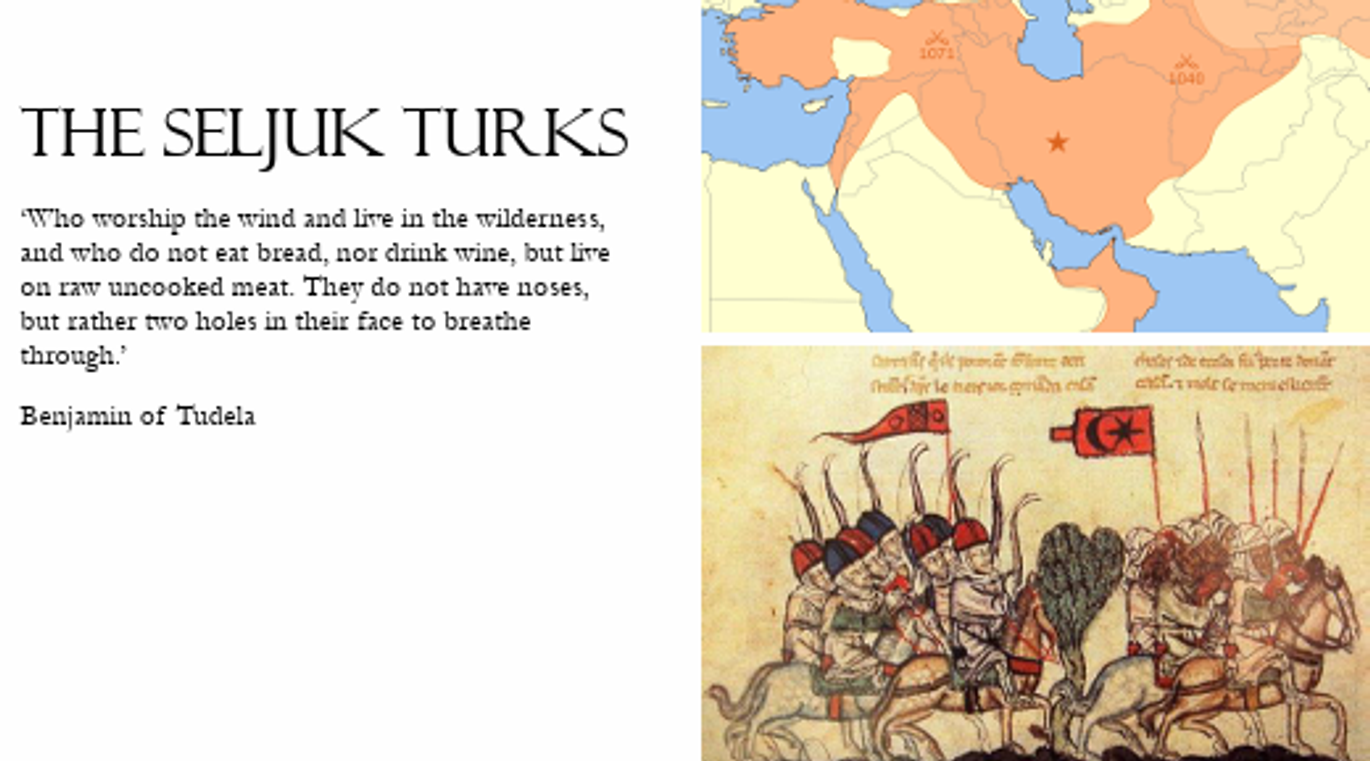
Council of Clermont
Why did Pope Urban II call for Crusades?
Raoul Meyer
(Nov. 1095, Council of Clermont) Pope Urban II called for expedition to liberate holy places East
Greg = reform pope held church council
spoke out against clerical marriage
spoke out against France King’s planned excommunications
last day council: called upon every man present to preach new military endeavour; to take up their swords to liberatre oppressed Chritans ME
Urban wanted to unite Europe (best done by giving them common enemy → help Byzantines)
idea East needed to be liberated (for unity ⛪, but also to herald the end times)
Accounts Urban II’s crusade address @ Clermont broadly agree that he called for the liberation of eastern churches & dwelt on the distress being suffered by his aud.’s co-religionists (R47).
Improve his own rep. & standing as pope (Byzantines didn’t recogn. papacy)
Historical view now: what response to his call crusade did Pope Urban II envisage?
Evidence 🎭 (find) Pope Urban II had envisaged _ ⚖ response which would →…
modest military supp. for Byzantine empire (threatened by the Seljuk Turks) as Alexios I had received ← Count Robert of Flanders in 1086: 1000
armed pilgrimage to Jerusalem, such had occurred before in 1064
How pop. were crusades in reality?
Instead, response massive in scale
Perhaps as many as 100,000 crusaders
Papacy left barely/ @ least intermittently, in control a pious institution & cultural practice which developed its own momentum & came to be essential part MA European exper.
Where were most crusaders ←?
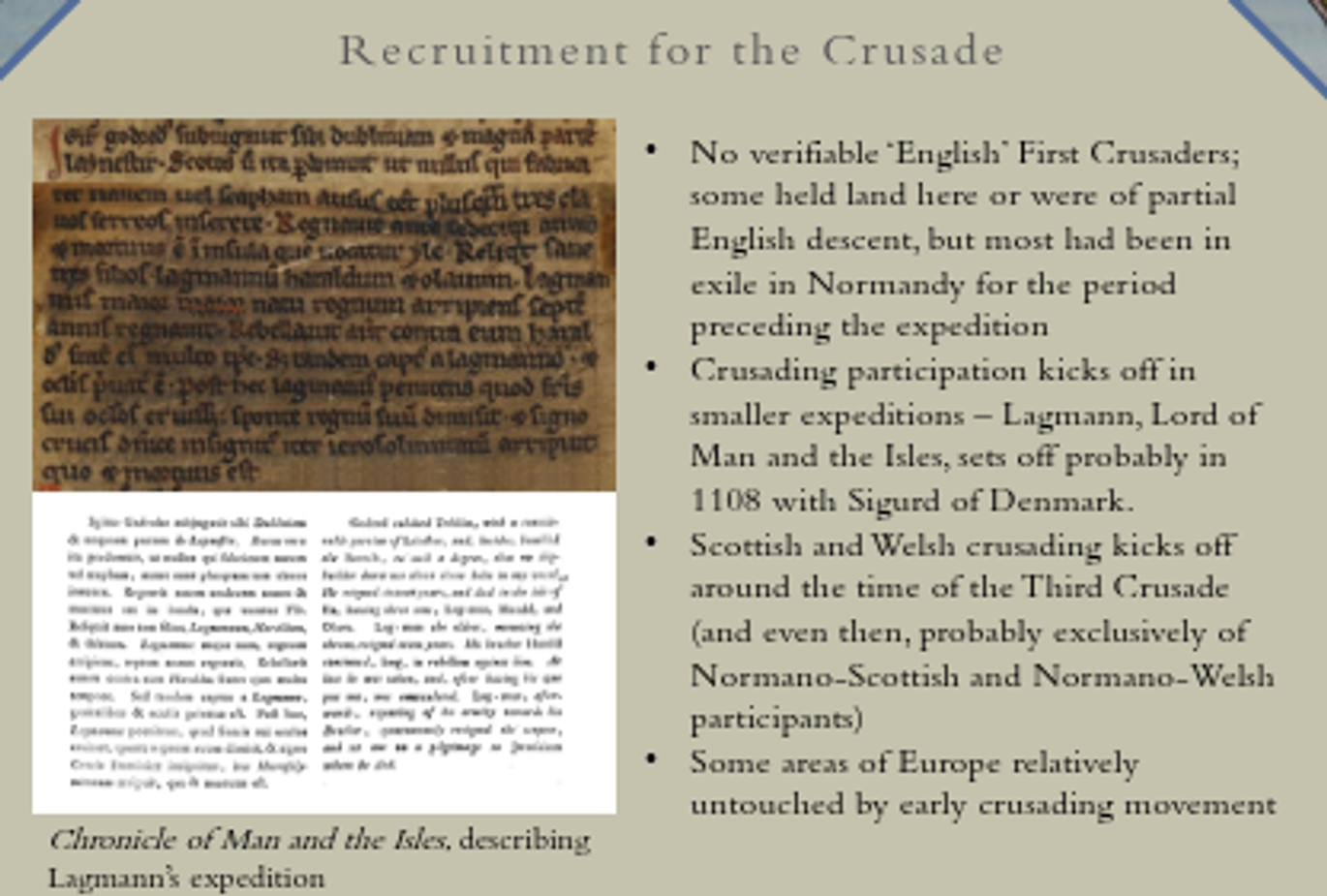
Why did call to crusade reach such receptive ears? motivations
pious desire to help fellow ✝s
Jonathan Riley-Smith
Crusading expressed fraternal 💘/ of one’s neighbour - pereived 💘 for suffer. ✝s elsewhere
(Sep. 1096) Pope Urban II promised indulgence to Bolognese who joined 1st Crusade, ‘seeing that they have committed their property & their persons out of 💘 of God & their neighbour’ R5
(writing in 1140s news ☪ victories in East) St Bernard asked If we harden our 🫀s & pay little attention… where is our 💘 for God, where is our 💘 for our neighbour?’ R6
Baldric of Dol’s account of the sermon @ Clermont…
Emphas. supposed suffer. Eastern ✝s
Made Urban disting. bet. barbarisms internal strife 🇫🇷 & virtues helping East.
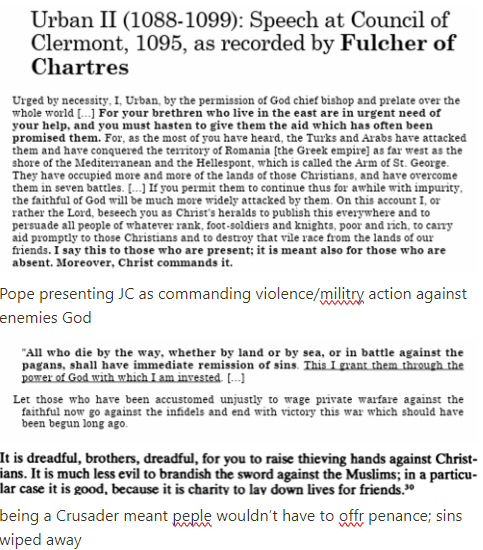
How was this exacerbated by notion kinship?
crusading charity presented to laity as example 👪 💘, us. imagery 👪 feud → 🩸-feud waged against those who had harmed members JC’s 👪
one is legally, socially, reputationally reliant on who you know & who will back you
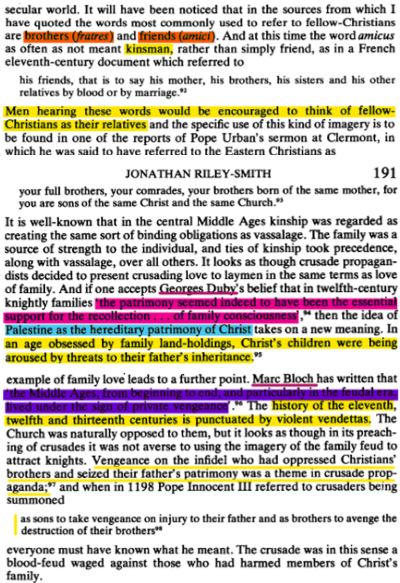
Crusades 🛍 renewed spirituality MA
To many Crusaders, Crusades primarily military operations but pilgrimages (relig. motivations).
✝ endorse holy war (war might be just but fighting → heaven, but pilgrimage to holy shrine could) → Urban pitched Crusade as pilgrimage w/touch warring on the side.
To Crusaders, tak. up arms to protect JC & his kingdom. = way to show their devotion.
Sewing cross on garments as symbol his vow to crusade 👓n as response to Christ's statement: 'Whosoever doth not carry his cross and come after me cannot be my disciple' (Luke xiv, 27).
Expressing their 💘 God.
Treated as 'soldiers JC’ - joined expedition out of 💘 for him.
primary source showing this
anonymous author of the Gesta Francorum, who took part in the First Crusade, opened his narrative with a moving reference to the subject.
When already that time drew nigh, to which the Lord Jesus draws the attention of his people every day, especially in the Gospel in which he says, 'If any man will come after me, let him deny himself and take up his cross and follow me' (Matt. xvi, 24), there was a great stirring throughout the whole region of Gaul, so that if anyone, with a pure heart and mind, seriously wanted to follow God and faithfully wished to bear the cross after him, he could make no delay in speedily taking the road to the Holy Sepulchre."

Understanding of this can help us place crusades in context spiritual reawakening W.Europe that accompanied C11 reform movem.
Crusades as much a 🛍 renewed spirituality MA as…
concern for living vita apostolica
expressing ✝ ideals in active works charity…
Indeed, theology merit ⇒ particip. in crusades believed to be meritorious
expeditions penitential acts could gain indulgences
😵 in battle 👓n as martyrdom
As were new 🏥s, pastoral work Augustinians & Preoomstratensians & service friars. Sprang ← same roots.
loyalty to God necessitates war (think above comparison; connection to JC’s pain makes one a better Christian, perhaps?): obed. to God more important than negating killing & bloodshed; unbelievers don’t count & not worthy because they are against God & God thus wants this (check link; this is waffle)

Why did call to crusade reach such receptive ears?
Urban’s framing penitential crusade reveals motive self-interest & hope for personal gain?
spiritual privilege
(1108) Guibert of Nogent welcomed fact now laymen could attain salvation through works w/o entering monastery.
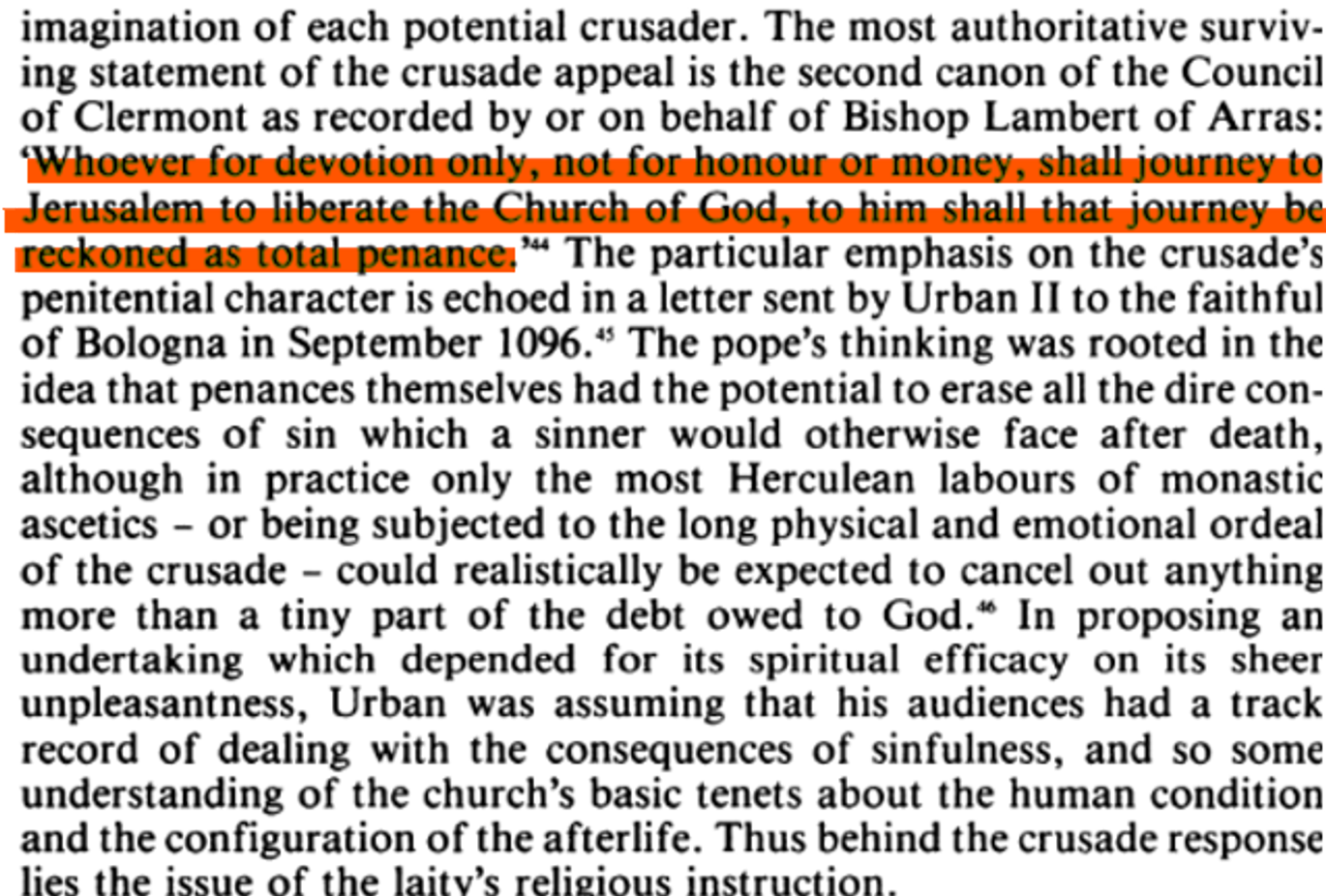
Why did call to crusade reach such receptive ears?
greed (‘Younger sons’ theory)
Post-& anti-colonialist view comes ← Marxist reading history; once promoted & embraced by scholars
Knights who went adventuring in Levant = 2nd & 3rd sons wealthy nobles who (because of European inheritance rules) had little to look forw. to by staying in Europe & lots to gain (in terms of plunder) by going to East.
Practice primogeniture → younger sons went on crusades in serarch fortune/ land they would not inherit same ß their parents (like their oldest brother)
(Jonathan Riley-Smith) Weak evid. Crusade charters 🎭 most those who responded to Call crusade not knights but paupers.
Nobles who went were lords of estates, not their wastrel kids.
VERY little evidence of that; where people had en. resources to go on crusade, tended to be older sons, uncles… w/more resources to supp. their activities
1st sons went on crusade as often as younger sons.
Seem gen. been motiv. by spiritual concerns.
Either way, dichotomy bet. relig. motivations & self-interest
papal control can be overstressed - & fanaticism had its cultural context → rational, irrational
nevertheless, an endeavour req. singif. dedication & investment → worth ask. why
societal benefits for doing so; lay piety; local abbeys; networks elites
land or doing it because crazed relig. fantacists who didn’t have any rational consideration of what they were doing
can be both
relig. motivation works best when backed up by some pot. tangible advantage
religious motivations not necerrily irrational relig. motivation; raather it is better backed up by material advantage or vice versa
Pope not necesserily the reason poeple went; if people in thier communities travelled then others dependent had to do (e.g. lords, then his knights dependent on him had to go) - after tipping point, inevitable going to be large groups people going
most people reliant on those in their community. If didn’t travel when they did, would lose the basis for their survival.
cultural context explains massive impetus people mov. → East
societal benefits:
reputatinal: if their neighbours were doing so, to not join crusades was embarrasing for them; wanted to perform their status of knights & lords
networks lay piety (talked ab. last week): local abbeys all too happy to prov. money &resources to knight who wanted to go in exchange for temp. looking after their land (might be permanent if they died on Crusades)
networks elites egging each other on, people/monasteries taking on their land whihc had material advatnage if they died
Marcus Bull: ab. network lay piety built up throughout C11, boosting it v/much in tangible networks recruitment
Riley-Smith: more to do with that type partic. relig. motivation; perceived love for suffering Christians elsewhere & indeed love for enemiesreligious motivations not necerrily irrational relig. motivation; raather it is better backed up by material advantage or vice versa
Pope not necesserily the reason poeple went; if people in thier communities travelled then others dependent had to do (e.g. lords, then his knights dependent on him had to go) - after tipping point, inevitable going to be large groups people going
most people reliant on those in their community. If didn’t travel when they did, would lose the basis for their survival.
cultural context explains massive impetus people mov. → East
societal benefits:
reputatinal: if their neighbours were doing so, to not join crusades was embarrasing for them; wanted to perform their status of knights & lords
networks lay piety (talked ab. last week): local abbeys all too happy to prov. money &resources to knight who wanted to go in exchange for temp. looking after their land (might be permanent if they died on Crusades)
networks elites egging each other on, people/monasteries taking on their land whihc had material advatnage if they died
Marcus Bull: ab. network lay piety built up throughout C11, boosting it v/much in tangible networks recruitment
Riley-Smith: more to do with that type partic. relig. motivation; perceived love for suffering Christians elsewhere & indeed love for enemies
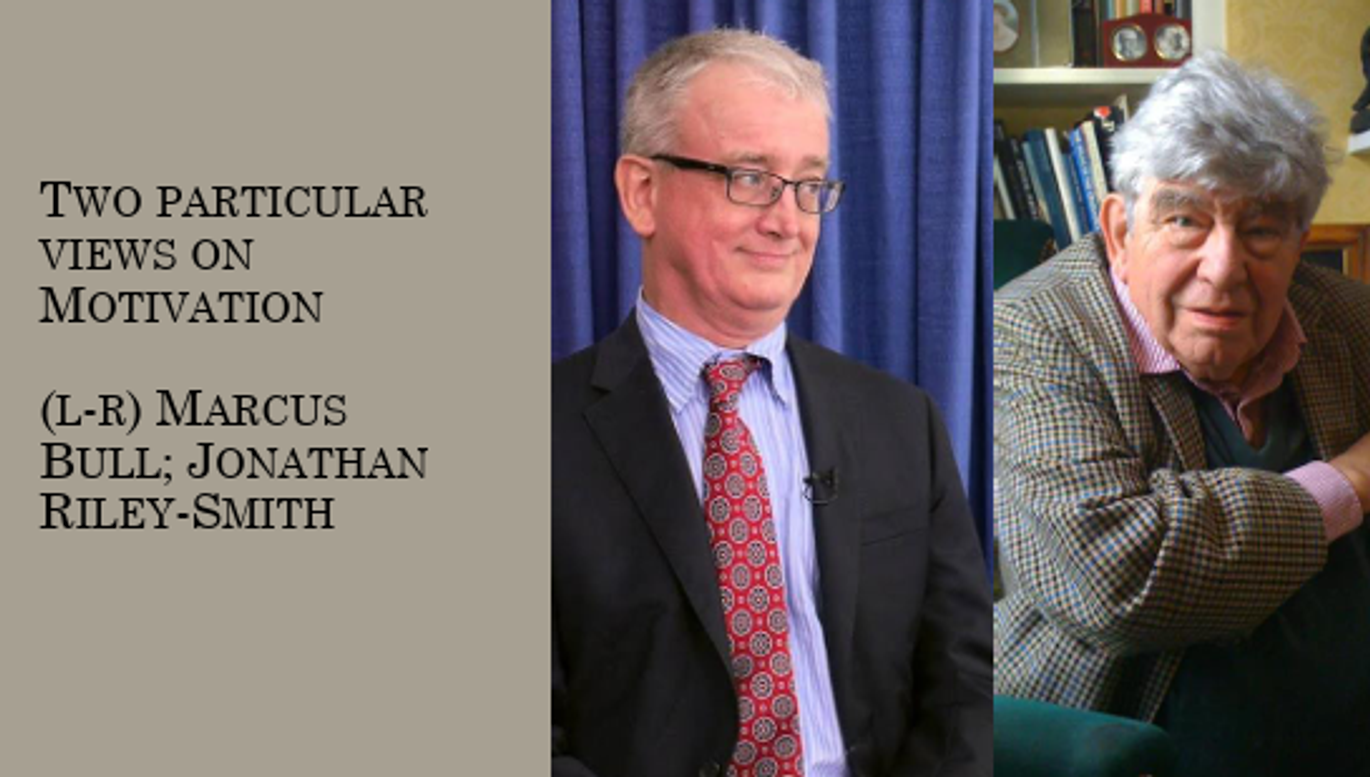
Was ⛪ in control growth phenom. crusading?
Did ⛪ understand/able to harness the forces it was unleashing 1095-6
🔗 motivations
Urban’s contemporaries believed he was mainly responsible for launching the enterprise → maintained control (appearance auth.)
(Modern scholarship) takes ambivalent view Urban’s achievem.; whilst he properly credited w/devising the crusade, lost control his brainchild in months post-Council of Clermont, w/his planned propaganda offensive by ⛪ hierarchy being hijacked by pop. preachers, & w/spiritual rewards he offered to crusaders being grossly exaggerated by theologians in order to whip up enthusiasm amongst uneducated faithful.
Failed to restrict partic. on expeditions to adult 👨 fit to fight as he had hoped to do
In other respects, Urban’s grip on crusade quite firm.
check next seminar fc afterwards
papal control overstressed
Where were most crusaders ←?
(Jonathan Riley Smith’s tracking) Traced all named 1st crusaders
Only 0.2% W.European pop. and mostly ← corridor low countries, 🥖 & Bordeaux (large geographic spread; partic. consistent across W.Europe)
same here for 4th Crusade, whilst 2nd & 3rd crusade also had strong supp. in these areas but benefited ← royal governance so drew in participants ← further afield + their numbers m/_er
armies better equipped & more widely geographically distributed
(around 1170) large areas Europe which had pracitcally no involvem. w/actual crusading
certain areas untouched - e.g. British Isles
offered few crusaders to East before 12thC (not single identifiable 1st crusader whom we know name of that can justifably be called English, Irish, Welsh or Scottish
9 English/ Anglo-Saxon descent in exile in Normandy pre-1095/ their partic. somewhat doubtful
when they did start to travel, in unusual groupings & unexpected circumstances (e.g. border Isle of Man ruler → in act atonem. for blinding & castrating his brother)
english naval expedition did participate in 2nd Crusade - made up some of the forces which captured Lisbon
(slowly over course 12thC) eventually scottish & welsh came too but in small numbers
so is impact but slow to come in & initially minimal (1st & 2nd crusades)
seeing growth in partic. byt slow over course 12thC
This is the same in Spain
no single unambig. 1st crusader; most motivated in that way would want to stay & fight locally
(mid 12thC) Spain → area crusading activity itself in proper, papally justified way (dev. trad. crusading in Spain’s aristocracy)
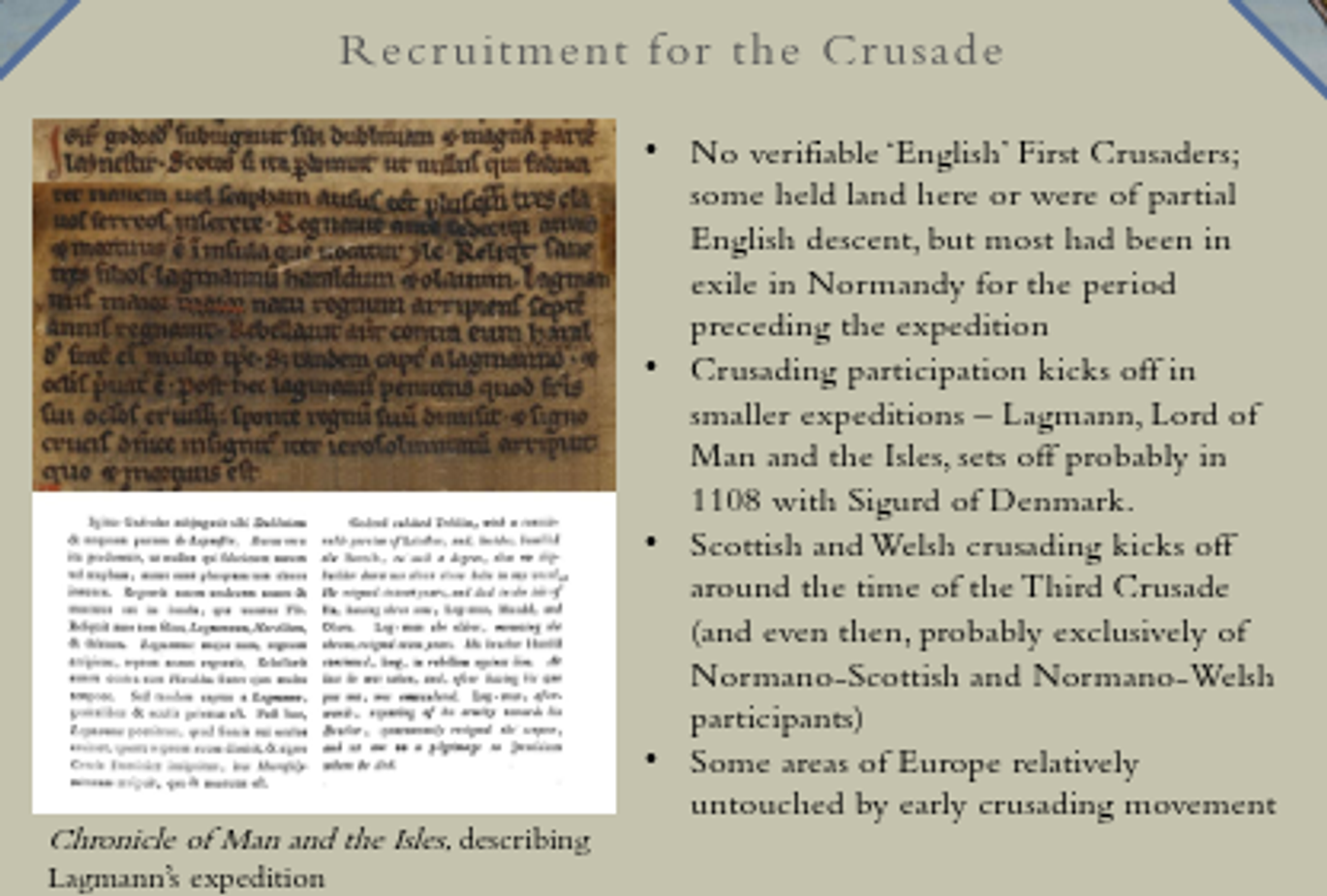
To what extent is crusading about Jerusalem, and does this change over time? Is there a firm line between it and 'holy war'?
Jerusalem = centre Christianw orld in Christian world view
eschatological concerns
last emperor (check recording)
HL as itself a relic
communion w/physicality JC
every part Holy land = surviving element JC & disciplines
physicality JC: places where he’d walked were attractive elements to MA: pilgrimage
Therefore…
most medieval maps represented by these 3 areas joned tog. by Jerusalem (JC’s area + will be location revelation/ end time - needs to be in Christian hands for it to happen)
Christianity felt Jerusalem to be temporarily lost even though had fallen into Muslim hands 7thC
→ more self-interest than religion
→ was Jerusalem really that important? or did it → religion for the sake of bloodshed?
leadership: secular & ecclesiastical - often not easily distinguishable because of investigure system (spare → church); interests of these groups (aristocracy) had resulted in mixture that couldn’t easily be divided
Investiture Controversy - Wikipedia
more than geopolitical war liberation - more at play - personal reasons, etc
primary source reading: comparison Crusader’s suffering to JC’s suffering
loyalty to God necessitates war (think above comparison; connection to JC’s pain makes one a better Christian, perhaps?): obed. to God more important than negating killing & bloodshed; unbelievers don’t count & not worthy because they are against God & God thus wants this (check link; this is waffle)
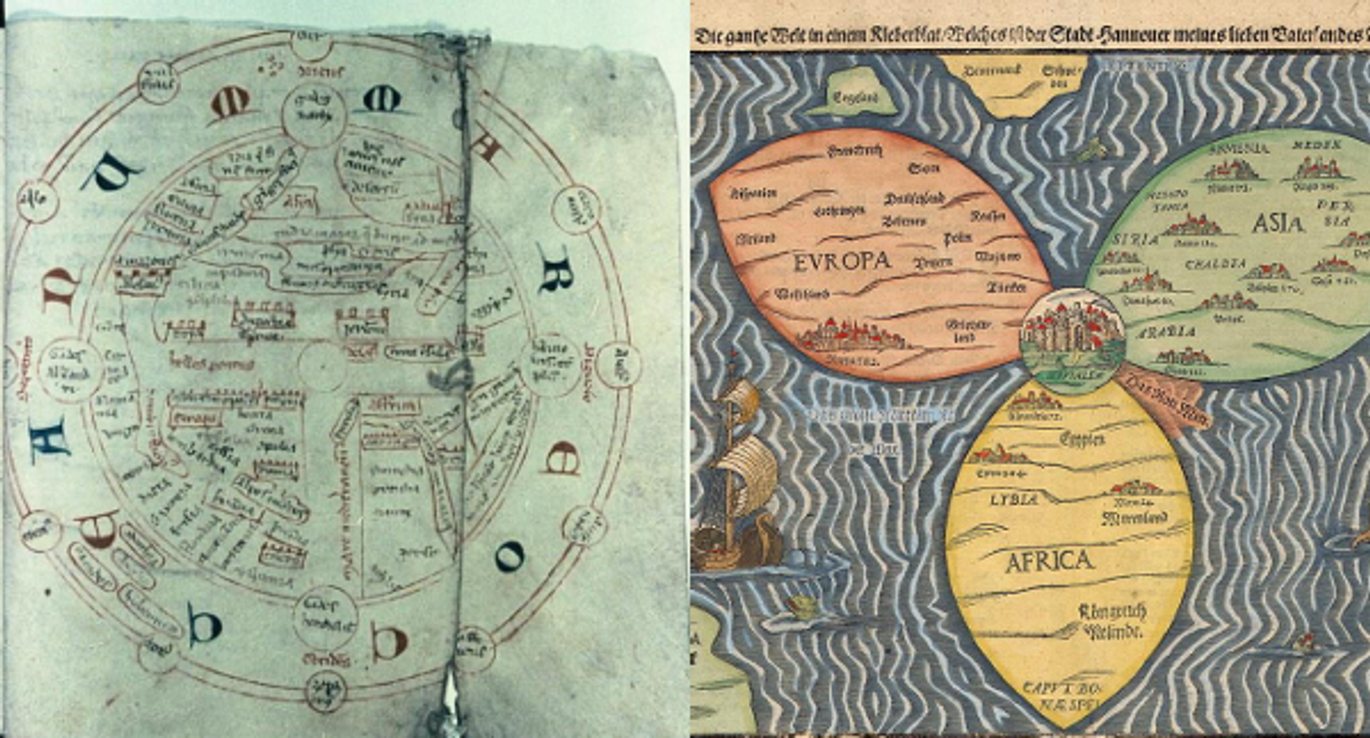
4th Crusade
by time 4th crusade, crusades against christians
end up capturing greatest Christian city in Europe despite Pope’s calls to get them back
but provdes good stop point for western christians
viol. agianst Chtistians → more justified
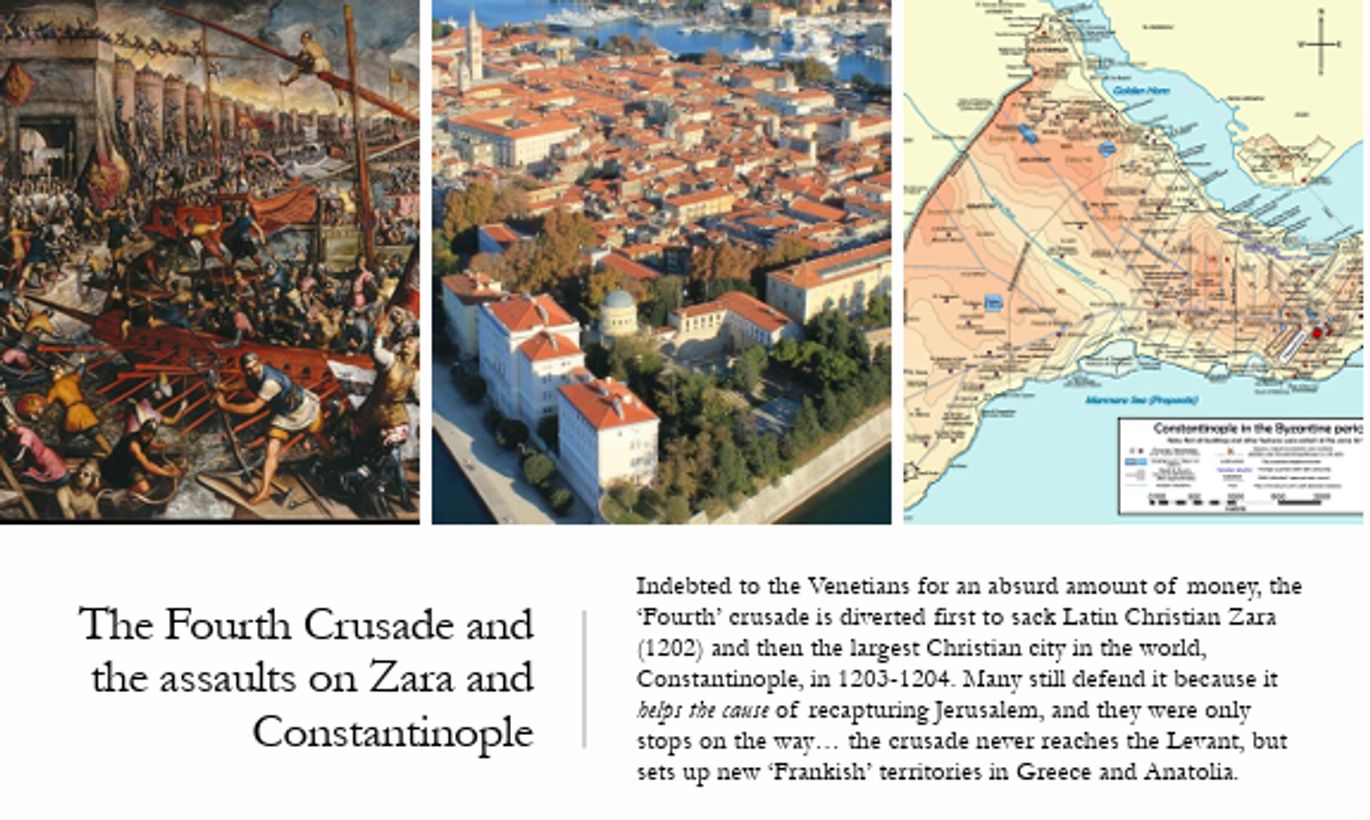
impact crusades
fall Acre signalled end plausible effort to recapture these holy places for Christianity (1291 no longer viable → became generalised & institutionalised & internalised within Latin Christian culture in Europe as tomorrow’s lecture will look at)
even c14 & 15thC german wars in italy & england wars in france classed as Crusades - becomes foundation for how we examine war/foundational element European warfare
foundiona cultural practice of MA Latin
not just someth. European knights did on holiday but foundatinal element of what European Latin culture was like
looking at Crusades allows us to see intersection/ collission 2 worlds - not sep.
validity fram. European history as sep. ← broader Levantine Asian history becausee these wrolds massively collide dur. this period in v/interesting ways
1st Crusade most pop., but even then
large prop. popul.recruitment geographically restrictured
limited impact in terms changes to trade, imports, material culture
multiculturalist empahsis belies fact interactions happened before (trade, spices, new types horses…
seem to have impacted demographics/ 👪 relations(older scholarship) social dynamics West not changed massively by Crusade because younger sons went off & fought on Crusade
→ (apart ← in few locations where crusading → someth. of a craze) tangible impact on European communities was relatively limited
Nevertheless, crusades as form sacrilised warfare/ holy war directed tow. recapturing HL → m/larger phen. than wars themselves had ever been.
Insead → cultural platform for perform. piety, aristocratic virtue & noble suffer. for meritorious cause (akin to how we use word now, crusade against child poverty)
Crusade turned in on itself & → framework for warring against other Christians, purifying soc. & draw. lines distinction bet. types 🧍which supp. nationalism & group identity.
as war → mental cultural obsession Latin Europe
crash course ones too
memory & adaptable phenomeon bale to tb adapted to diff. contexts
doesn’t remain stable phenomenon - hency why analysing motivations and benefits of it is crucial
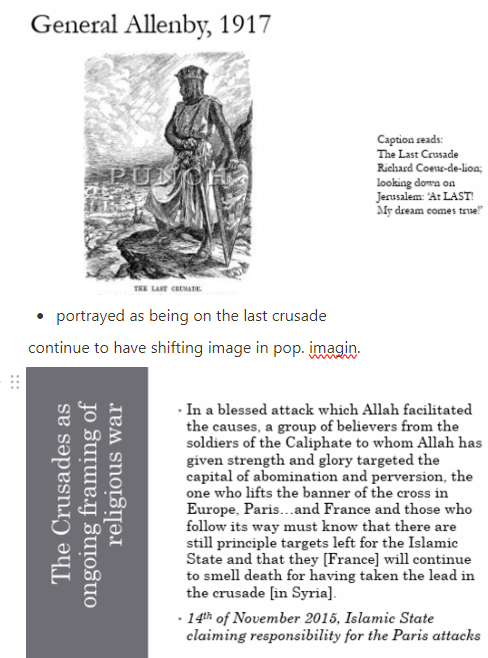
heretics within - heretics, rivals & internalisation ‘crusade’
widening category ‘crusade’ to include crusad. against schismatics & heretics
Innocent II & Council of Pisa (1135)
How did this contrib. to crusades being used to pursue fellow ✝s?
Dictates those who fight enemies JC (wherever they may be) are entitled to same spiritual benefits as crusading
any person who fought against enemies Latin church would deserve same spiritual benefits Urban promissed (remission sin)
trying to get faithful to oppose roger of scicily’s threat (in conflict w/papacy) - this was its immed. context
removed ← context, this is huge ideological leap: able to fight against Christians (as enemies faith), call it a crusade and get same spiritual benefits
heretics within - heretics, rivals & internalisation ‘crusade’
widening category ‘crusade’ to include crusad. against schismatics & heretics
define heresy
what is nature of heresy
key points contention
understand. heretics
Definition of Heresy
Heresy: Belief contradicting RCC teachings
Heretic: Individual engaging in heresy
Nature of Heresy
Often used as rhetorical claim rather than distinct category
Applied loosely/ exaggeratedly to
creditcertain viewpoints/individuals, rather than accurately representing clearly defined category beliefs/ 🧍s.Problem w/word heretic is that heretics think they are being better Christians: merely category which doesn’t tell us much about what they believed - rherotical claim (who decides who is the correct Christian - papacy)
doesn’t tell us much ab. what people believed who were described in documents as heretics
also we don’t know TWE (extent) departed ← Catholic orthodoct: were not necessarily same extremes in their departure ←
RCC authority used term and they preferred to paint them tog. as enemies, same as subjects for punishment - prob. not all heretics to same extent (bunch corrupt, false Christians who disrepescted key tenants Latin faith)
Diverse beliefs labelled under this term
Orthodox tendency to stereotype heretics as idolatrous and sexually deviant
Key Points of Contention:
Disputes over the nature of the Mass and Trinity
Debates regarding the nature of sin
Understanding Heretics:
Difficulty in discerning actual beliefs of heretics
RCC portrayed heretics as adversaries
Discrepancies between the beliefs attributed to heretics by the RCC and their actual beliefs
heretics within - heretics, rivals & internalisation ‘crusade’
widening category ‘crusade’ to include crusad. against schismatics & heretics
Wendish Crusade
deets
signif.
Military campaign 1147, 1 Northern Crusades.
German archbishoprics Bremen & Magdeburg sought the conversion to Christianity of neighboring pagan West Slavs
(1108) Archbishop Adalgod of Magdeburg called on secular & ecclesiastical rulers W.Europe ask. for supp. against pagan Wends
employed lang. crusade (soon after 1st crusade)
‘liberate our Jerusalem […] most renowned Saxons, French, & Flemings… this is an occasion for you to save your souls &, if you wish it, acquire the best 🟩 in which to live.’
Idea being able to save soul through fighting being applied as early as 1108 being military activity
strictly directed @ capturing Jerusalemdelib. equation diff. kinds conflict?
(1147) Raids into pagal territory rec. papal blessing after Council Pisa 1135 + into 2nd Crusade
those departing on them were allowed to sew Crusade crosses onto their cloaks to indicate they were spiritually just like Crusaders
1171 papal bulls every year sancitoning these yearly raids into Christian territory, tak. plunder → Christian cities of the German state
Partic. Wendish campaign complained…
‘is not the 🟩 we are devestating nor our 🟩 and the 🧍 we are fighting, not our 🧍?’
Widening crusade → Papacy less concerned ab. its direction
rhetorical & mental framework applies to other types conflict - any time legit. conflict backed by some element church
crusade legitimately applied not just to move. to recapture Levant (holy places in East) but also could be tool to advance interest Latin faith elsewhere
Wendish Crusade (🔗 Council Pisa)
motivations
🟩s inhabited by Wends rich in resources
productive farming land (mild climate Baltic area allow. for cultiv. 🟩 & livestock
animals this region thickly furred, supp. dependence fur trad.
Access to the coastline also developed fishing and trade networks.[2] The land was attractive for the resources it boasted, and the crusade offered an opportunity for noble families to gain part of it.
Albigensian Crusade
Why did heresy → singif. concern under Innocent III (1161-1216)?
Heightened concern ab. relig. purity & orthodoxy
Change in institutions learning → heresy emerges as signif. focus
↑ auth. elders → ↓ room for
agreem.→ encourag. ↑ consensus theological issuesas relig. movements & uni masters defined orthodoxy, some people fell outside that defin. orthodoxy & were persecuted as heretics
PS: Abelard, The history of my misfourtunes (c.1132) → Statues of the Uni of Paris (1215) - sheet
themes
ecclesiastical reform & papal power
relig. movements
ways think. & educ.
Albigensian Crusade
Cathar beliefs
Absol. dualists (undermined v/foundations Christian belief)
2 🌍s
Divine,
material🌍 spirit, created by good Godcorrupt material 🌍 created by Devil (dirty evil prison to escape ←) → sex dirty
Absolute: good & evil (repres. by God & devil) instead eternal forces that have alw/ existed & have nothing to do w/each other
God created & rules over spiritual realm, Satan the material
Appear to have equal standing in some sense
The Book of the Two Principles
Anti-materialists
Like gnostics, rejected most OT & its prophets as proponents satan
Couldn’t accept God described in it, who orders destruction & massacre various groups peple to be true, good God desc. NT
Instead, must be evil creator Satan.
Deny JC’s human nature (only appeared to take on a human body but really a spiritual being)
never born VM
never hungered/ thirsted
never truly cruficied but only appeared to do so
-> JC’s role v/diff. to RC
sent by true God to help manking but he did so by est. initiatory church which RCs saw themselves as tak. part in (Apostolic Succession) & whose job it was to help spiritual parts human beings escape <-- evil prison body & return to heaven <- when came
symbol cross = false idol to be rejected
rejected sacramanet & baptism through water as evil innovations
Denied common doctrine physical resurrection dead @ end time + Day of Judgem.
human being sought to be freed < mat. world through prac. Catharism
human soul reincarnated into new bodies until this release achieved
Implications
Instead, believe (end times) creation light (which resides in mat. prison) will be separated <-- evil & 2 worlds --> distinct again
denies God’s omnipotentce (because there is a rival)
prolonging human existence on Earth = moral sin ⇒ only pursuing good spiritual world is sin-free (only those who rejected physical world for spiritual life/ perfection to be saved)
good men escaped world & everyth. assoc. w/it
→ would reject physical possessios, eskew sex, reect all physical possessions → living saints whom others could follow
Albigensian Crusade
Cathar practices
Extreme ascetics, not eating meat, avoid. physical & sexual temptations & rejecting wordly pleasures.
lifetime chastity
Material world inherently sinful → sex seen as v/dirty & sinful; satisfied lusts physical body & served as means creat. new material life, which wasn’t to be preferred (sim. Manichaeism - 13:50)
uneasy attit. tow. procreation well-expresed in tragic comic account when RC tells her pregnant friend shhe would ‘ask God to free her <- the demon which she had in her belly’
good to mortify flesh & shorten human life
Dietary restrictions
Practiced form vegetarianism, often consuming only fish and abstaining from meat and dairy.
Ritual fasts
Reg. fasting regimen, including three days of fasting per week and longer fasting periods of up to 40 days.
Consolamentum (initiatory ritual)
Sacrammental ritual akin to baptism, symbol. spiritual purification & remission sins.
baptism perfoemd on infants who don’t grasp signif. ritual & can’t choose to -> initiated
water material --> dirty
knon as ‘baptism of the spirit’ - detailed 15 mins
given espec. to sick & dying (quote above - this prob. what referring to)
when given it & initiated, all his prev. sins abolished - soul purified/forgiven (though can of course sin again -> be given it again)
Differed extremely <- mainstream Christianity
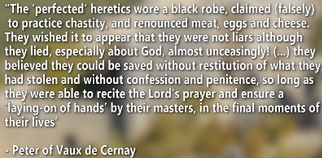
Albigensian Crusade
femina book has stuff on Cathar women
Albigensian Crusade
How est. were Cathars?
How m/supp. did they get?
Establishment of Catharism:
Hierarchical organisation: Varied ecclesiastical structure with bishops and diverse administrative roles.
Egalitarian, w/both men & women in leadership.
Supposed structure France pictured
Stratified community w/distinct roles for "Elect" and "believers" underscores structured belief system.
Complex church structure sugg. well-established movement.
Support & Influence
Evidence of support from various local lords and leaders in Southern France (sheltered them…), contributing to the movement's growth and endurance.
Created network infrastructure in which this cathar community could thrive @ least to some degree
(C12 & early 13) Cities e.g. Toulouse in region appear to have housed @ least signif. no Cathars, indicating substantial backing within region.
Raymond VI, Count of Toulouse held vast land power → rival to King France)

Albigensian Crusade
Why did RCC want to destroy Cathars?
Why did Albigensian Crusade start?
Highly critical RCC, consid. many its beliefs, rituals & practices misguided/ satanic
Sacraments RCC administered useless, its clergy corrupt & its wealth & power ill-got.
Went against RCC doctrines, possibly linked to ancient religious movements like Gnostics and Manichaeans.
Societally threatening to medieval belief systems: Cathars’ enemies said their perversion to sex must have obv. meant they engaged in bestiality & anal sex + more equal attit. to women.
→ Though never in majority, RC ease.
Debates took place bet. Cathar representatives & RCs + attempts here & there to try to counteract their spread BUT…
(early c13) Had en. after papal delegate apparently assasinated by people connected to Cathars whilst on mission in France
(1208) Pope enacted more drastic measures: Albigensian Crusade -> ended 1209
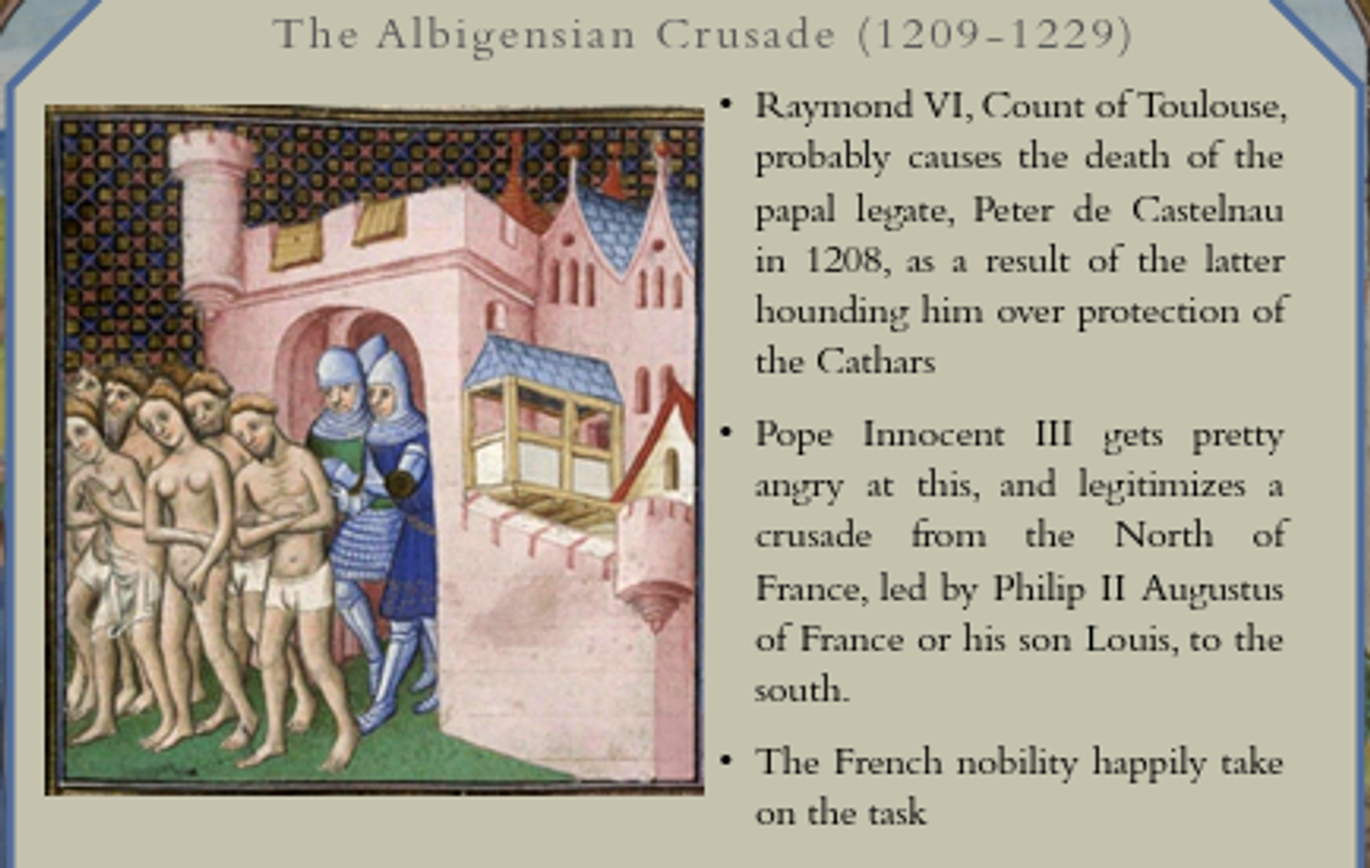
Albigensian Crusade
(1209-1229)
Violent campaign to suppress Catharism LANGUEDOC
Many cities assoc w/Cathar activity besieged & subjugated.
Cathars & their supporters/ associates often captures & burnt alive to death / assassinated
key is that not only being heretic but protecting. being sympathetic to heretics en. to make them valid subject crusading warfare
Famous anecdote of a crusader allegedly instructed to "kill them all" to distinguish bet. Cathars & Catholics → captures spirit these crusades..
Campaign marked by discrim. viol., termed by some as "genocide."
Despite conquests, many Cathar strongholds remained beyond control → inquisitions.
Nevertheless→ gradual decline & eventual appearance movement.
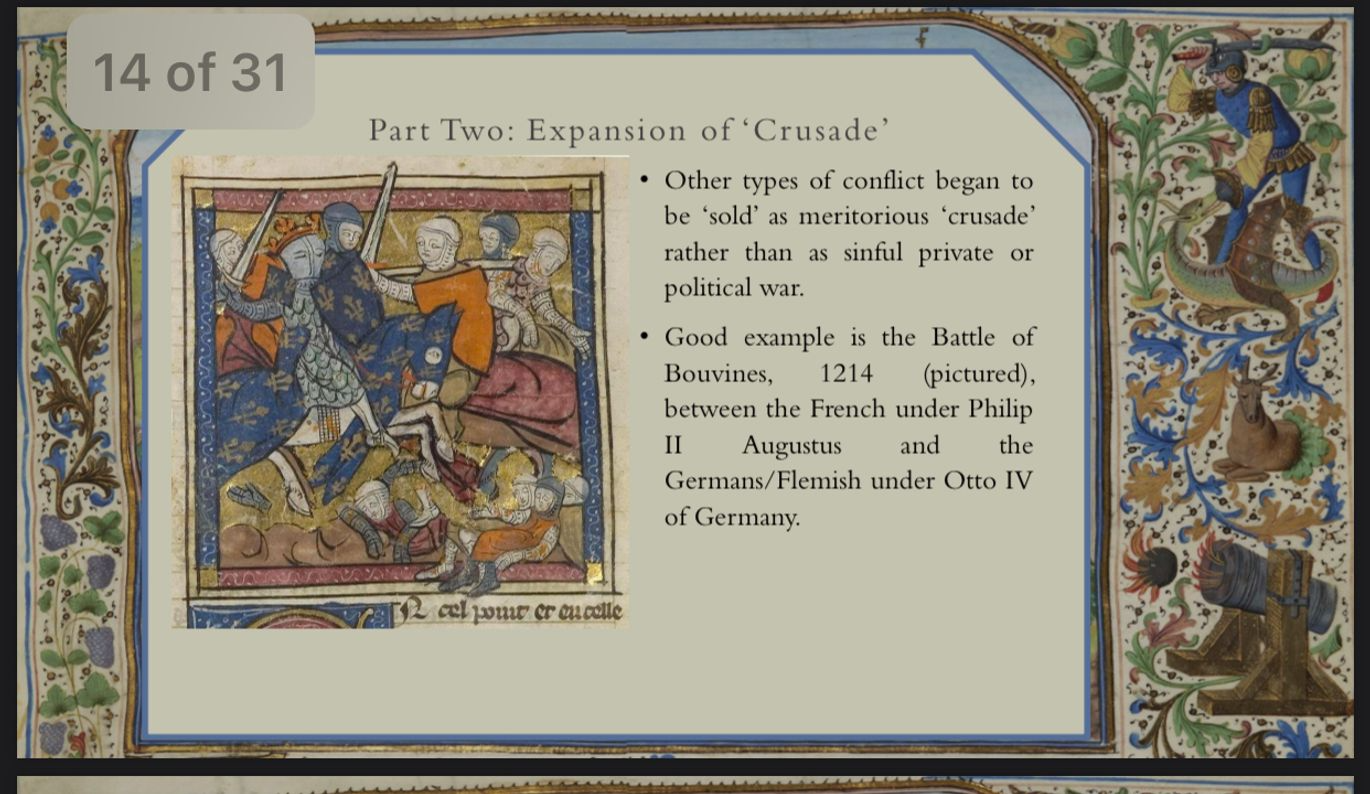
continued inquisitions → end Catharism
Malcolm Barber
(most C13) Send inquisitors continuously into regions assoc. w/Cathar activity.
numerous subsequent yrs inquisitional interrogations, tortures & forced conversions to orthodoxy
(by mid. C13) Infrastructure had supp. Cathat movem. had been compl. dismantled
Left its adherents w/o an organ. & often forced to be on the run
Continued to decline rest C13, w/exception brief revial led by brothers Peter & William (captured & executed 1309, 1310)
Never recovered <- persecition -> (by mid C14) find little record of their existence @ all
(1321) Last known Cathar executed -> underground?
(through their crusades & inquisitors) RCC had managed to quell this movem. & restore their own power in regions prev. influenced by Cathar ideas
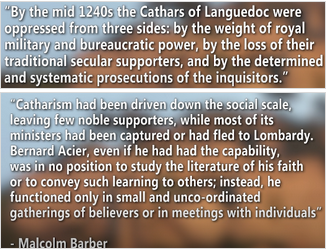
Did the Cathars actually exist?
Above = trad. narrative increasingly being challenged…
Idea unified heretical movem. that region more construction by RC chroniclers & modern scholars than based in reality.
Instead, spectre created by RCC @ time in thier their fear los. control
Catharism = manifestation social & political circumstances in region @ time, rather than actual relig. movem. that can be consid. to have been unified into anyth. resembling church/ hold. spec. dualistic doctrines
evid. ← range sources sugg. term applicable to group w/distinctive set beliefs & practices
only subsequently consistently imposed by historians attempting to create image mvem. like Reform. - an organised & coordinated attack on RCC
explains historical records & obeys Occam’s Razoe by not introd. new entity into history
Traditionalists:
Barber, Malcolm, The Cathars: Dualist heretics in Languedoc in the High Middle Ages, Second edition (Harlow, United Kingdom: Pearson, 2013)
Lambert, Malcolm, The Cathars (Oxford; Malden, Mass.: Blackwell Publishers, 1998)
Lansing, Carol, Power and purity: Cathar heresy in Medieval Italy (New York: Oxford University Press, 1998)
Taylor, Claire, Heresy in medieval France: Dualism in Aquitaine and the Agenais, 1000-1249 (Woodbridge, UK; Rochester, NY: Royal Historical Society/Boydell Press, 2005)
Skeptics:
Moore, R. I., The War on Heresy (Cambridge, Mass.: Belknap Press of Harvard University Press, 2012) https://clio.columbia.edu/catalog/141...
Pegg, Mark Gregory, A Most Holy War: the Albigensian Crusade and the battle for Christendom (Oxford; New York: Oxford University Press, 2008) https://clio.columbia.edu/catalog/141...
Sennis, Antonio (ed.), Cathars in Question (York: York Medieval Press, 2016)
Did the Cathars actually exist?
Word ‘Cathar’ appear in records C12 & C13 in Languedoc.
Word ‘Cathar’ appear in records C12 & C13 in Languedoc.
Inquisitors use gen. term ‘heretics’.
Nobody identiief as Cathar in records
If were cathars, why didn’t anyone use that term for them?
Term only used to desc. alleged group heretics 1140s (which likened to manichaenism, ancient dualist religion): to people in Cologne
Did the Cathars actually exist?
records
misleading interrogations
Sources problematic
alm. exclusively hostile (written by RC chroniclers)/ written @ later stage
Crusades/ inquisition defo took place BUT v/idea was anyth. like European-wide counter Church
Didn’t use term Cathars for themselves - term is C29 invention
evid. ← range sources sugg. term applicable to group w/distinctive set beliefs & practices
only subsequently consistently imposed by historians attempting to create image mvem. like Reform. - an organised & coordinated attack on RCC
Records may have been poorly translated/ doctored to make heresy seem more real
Inquisitors constructed heresy w/..
loaded & leading questions
many sessions conducted through multiple layers translation: Occitan -> French -> Latin & back
inquisitiorrs = N/French speakers engaging w/Occitan speakers
-> found what they were looking for, whetehr it was there or not.
Traditionalists simple accept outcomes of these inquisitorial sessions when we have good reason (historical & methodological) to be skeptical.
Confessing to being part dualist counter-church not mean actually was one
Good reason to doubt church redords.
Use torture, for example, ‘revealed’ existence pan-European heresy in which women made diabolical pacts to gain magical powers on ground they actively seek to destory christendom <- inside
Yet now scholars now virtually al agree simply weren’y any witches: whilst were folk/ ritual magic users, no organised anti-Chrsitian women-led heresy founded on diabolical pacts w/intent to destory Christianity
EM conspiracy theory, w/no evid. outside mind witch hunters & inquisitors
(same way) perhaps Catharism emerged & existed only in minds inquisitors.
Perhaps dualism emerged later as part larger relig. dissidence (reaction formation to persecution itself - persecution created dualists)
people agreed w/theological positions created & accid. popularised through v/proc. persec. by inquisition
inquisition thus double created Catharism: both in inquisitorial imagin. & then in reaction formation
Most prob. just common relig. peasants caught in web politics & religionm w/only _ minority being active relig. dissidents
The Inquisitor's Guide: A Medieval Manual on Heretics by Bernard Gui formed foundation all future witch-hunting manuals (how to interrogate witches + shift -> idea indiv. heresy social diabolical, seeks to undermine all of Christendom) - persecution Cathars = beta-testing for witch hunts & relig. persecutions would go on in NW against indig. popul.
Did the Cathars actually exist?
moderen skeptics: who were they in reality?
<- conflict over impositions gregorian reforms (greatly centralised ecclesiastical & clerical power)
indep. religiosity Langeudoc. grew into gen. relig. descent & thereby heresy (<- RC POV) people there, who just didn’t want to deal w/Gregorian reforms
this anti-clericism likely spawned early charsmatic paraclergy (local pop. relig. dissidents), who formed 1st wave event. ‘Cathar ecclestiastical structure’
Did the Cathars actually exist?
moderen skeptics: who were they in reality?
RCC misread spec. spec. regional, social & relig. customs Languedoc region
Misread social customs around these perceived holy men (cortezia) -> transformed them into forms heretical greetings (consolamentum ritual)…
Counter-church but informal social relations, relig. relations & practical idiosyncrasies in region systematically conflated w/practices Cathar counter-church
Did the Cathars actually exist?
moderen skeptics: who were they in reality?
Crusade used as cover story (complex political realities) to gain power region
relig. → secular concerns
🟩, wealth, forgiven. sins (🟩 grab)
King & French & English nobles vying for power in relatively autonomous area under power Count of Toulose → only too happy to take up Pope Innoc.’s request to lead campaign across France, tak. 🟩 aw. ←those who protected Cathars (stand. army its own).
King (whose power barely extended beyond 1/3) 👓 this as great opportun. to extend his 🟩s (econ. benefit, espec. since Eastern Crusades failed & in debt → craved recompense & purpose).
Spiritual benefits much closer to home than going on Crusade: opportun. to get same benefits crusade closer to home (espec. given disaster last 2 (4h & 5th Crusades) - much more convenient to fight heretics closer to home
Less ab. murdered papal legate & stamping out heresy & its nest in Langeudoc
e.g. Simon de Montford → huge 🟩owner in South, massively increasing their power & influence - ally French King - est. himself as the major power in the region + French nobility came to control nearly all Southern France
Did the Cathars actually exist?
moderen skeptics: who were they in reality?
Limited biblical toolkit → misread entire counter-religion into existence
Only toolkit Medieval Church had to deal w/relig. descent = patristic fathers, for whom arianism, miniahcaeanism, gnosticsm = central threat to Early Church
used these old records to analyse & classify relig. dissidents in cold war, accord. to terms & mythologies, even though these ancient heresies long extinct
imposing patristic categories onto medieval dissidents -> inquisitors misread entire counter-religion into existence
Did the Cathars actually exist?
moderen skeptics: who were they in reality?
Reaction-formation proc. (above), by which crusade & post-crusade inquisition persecution created _ no. actual dualists
e.g. writer Liber De Duobos Principis, who came to inhabit v/fictions
sociological evid. for this phenomenon: persecuted minorites can easily come to inhabit conspiracy theories of their oppressors as part of their resistance to that v/oppression
Did the Cathars actually exist?
Yet we like idea Cathars because…
Repres. powerful ideas…
relig. defiance
social autonomy
… all w/air profound tragedy, resisting to the end
many esoterics identity f/persecutred fringe sect - happy to project whatever ideals we happen to cherish on them: <- proto-egalitarian relig. feminism, fight-to-the-last-mansm, sheltering of the holy grail, survival ancient gnostic wisdom…
We need them to be medieval heroes for us
But should repsect past w/what it deserves most: intense, rigorous, prolonged analysis historical record, not looking for what we want to be there but what rlly was.
Albigensian imagerey continued…
increasingly, any military effort against schismatics/non-Catholics supp. by Papacy could be defined as such
(end MA) Hussite revolt in Kingdom Bohemia treated as v/sim. sort of war
Jan Hus had demanded church consist of all those who fervently believed in God & JC; that clergy & Pope were no better than any other type of man (think last week’s readings)
clergy demanded priests be stripped of their secular power, made territorial gains in Bohemia
No fewer than four subsequent crusades declared against these hussites
Papal bull issued against them; all heretics in Bohemia
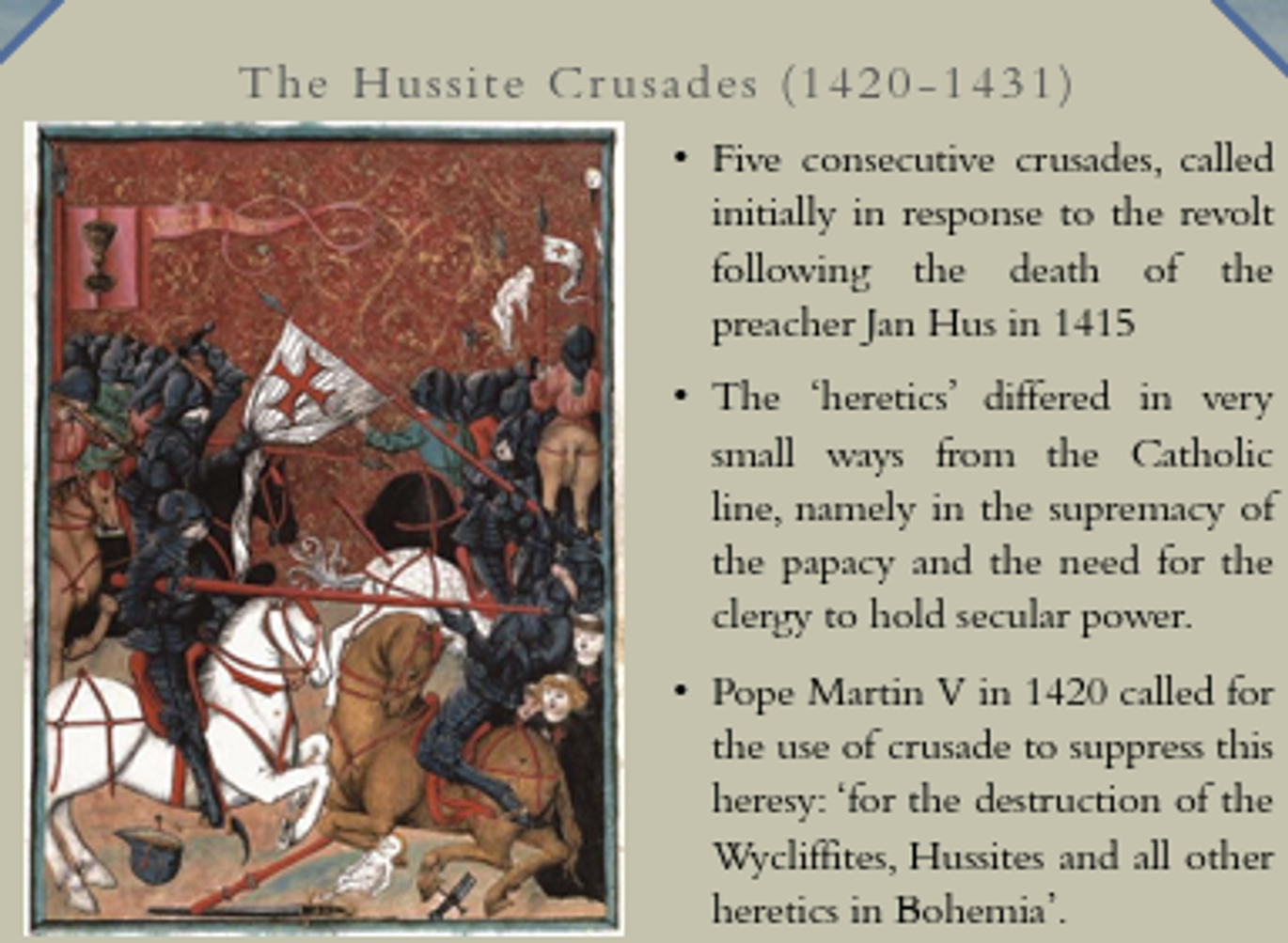
internalisation crusade
even c14 & 15thC german wars in italy & england wars in france classed as Crusades - becomes foundation for how we examine war/foundational element European warfare
foundiona cultural practice of MA Latin
not just someth. European knights did on holiday but foundatinal element of what European Latin culture was like
isn’t an end point to Crusades
crusading ideas & motivaitons utilised late into EM period
what appeared to be crusading conflicts occur. as late as picture above, where crusader military order being attacked by Islamic countries
understood their defence city as a crusade
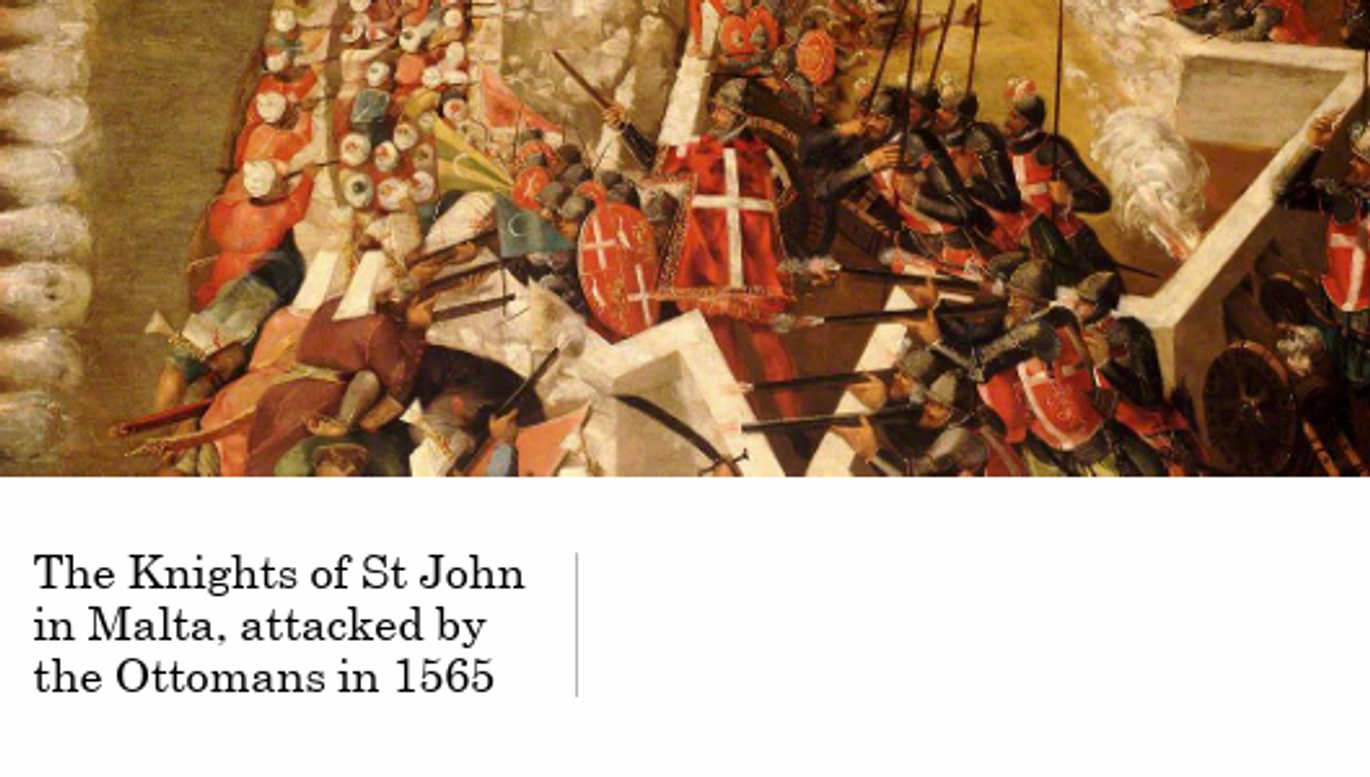
crusade as heroic landscape - check fc if needed